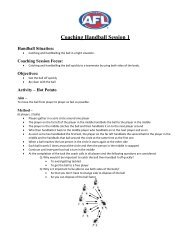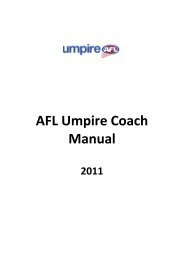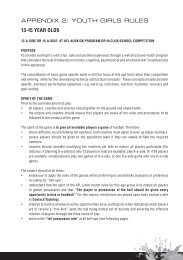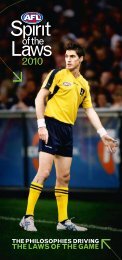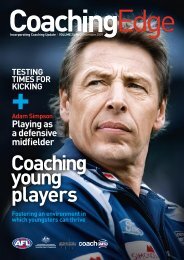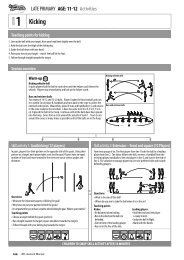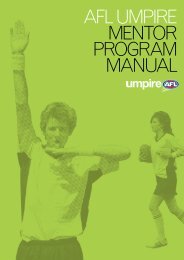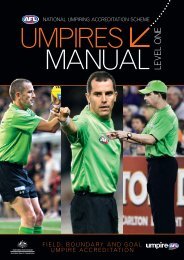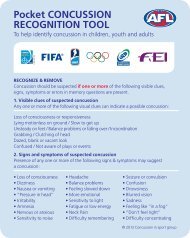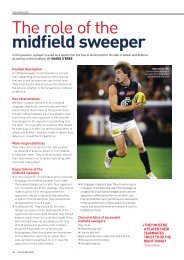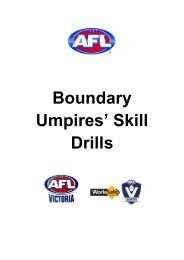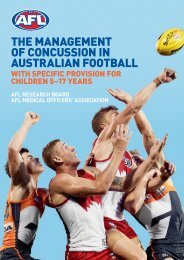AFL Coaching Manual - Western Bulldogs Football Club
AFL Coaching Manual - Western Bulldogs Football Club
AFL Coaching Manual - Western Bulldogs Football Club
You also want an ePaper? Increase the reach of your titles
YUMPU automatically turns print PDFs into web optimized ePapers that Google loves.
the coach<br />
chapter 2 – basic skills<br />
DevelopING<br />
SkillS<br />
Young players pass through<br />
various stages from first<br />
learning a skill to mastering it.<br />
The length of time this<br />
takes will depend on the<br />
individual player and the<br />
quality of coaching.<br />
Factors to be considered include:<br />
n The ability of the coach to<br />
teach or demonstrate the skill.<br />
n The skills must flow from<br />
simple to complex.<br />
n Some players will learn<br />
at a faster rate.<br />
Phases of skill learning<br />
In general, footballers pass through three stages of skill learning:<br />
1. Early Stage<br />
Where large numbers of errors occur as the player attempts to perform the<br />
skill. The coach needs to provide demonstrations, verbal instructions and<br />
positive corrective feedback to encourage the player.<br />
2. Intermediate Stage<br />
Where the footballer has achieved a basic level of competence and can start to<br />
perform the skill at a faster rate and practise it in an appropriately structured<br />
competitive situation. The coach is required to have the player practise with<br />
opposition and in game like situations.<br />
3. Advanced Stage<br />
When the skill becomes automatic the player is able to perform the skill under<br />
pressure without consciously thinking about it. The coach extends the players<br />
by working on advanced skills and team plays and players are encouraged to<br />
evaluate their own performances.<br />
neat skills:<br />
Australian <strong>Football</strong> requires<br />
players to execute their skills<br />
constantly under pressure,<br />
as Brisbane Lion<br />
James Polkinghorne<br />
shows here.<br />
Individual<br />
Skills<br />
Skill can be categorised<br />
as an individual skill or<br />
team skill.<br />
Once the player has learnt the<br />
basic individual skills, they<br />
should be further developed into<br />
game-like situations at training.<br />
The player is then required to make<br />
decisions about what to do with<br />
the ball, when to do it and how to<br />
execute the skill under pressure.<br />
However, it is vital that the basic<br />
skills of the game are taught<br />
correctly. The effective coach must<br />
break the skill down into simple<br />
manageable segments before<br />
progressing to more advanced skills.<br />
The skills of Australian <strong>Football</strong><br />
Individual skills in Australian <strong>Football</strong> can be classified under three<br />
general headings:<br />
Disposal<br />
Skills<br />
Kicking<br />
Handball<br />
Ruck tap<br />
Possession Skills<br />
Marking<br />
Receiving Handball<br />
Bouncing<br />
Picking Up<br />
Evasion<br />
p Baulk<br />
p Side step<br />
p Spin<br />
CONTACT<br />
Skills<br />
Tackling<br />
Bumping<br />
Shepherding<br />
Smothering<br />
Spoiling<br />
RELAXED:<br />
Collingwood’s Scott<br />
Pendlebury has an<br />
excellent kicking style.<br />
18<br />
19



